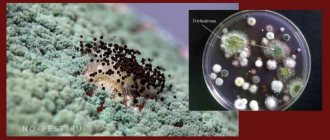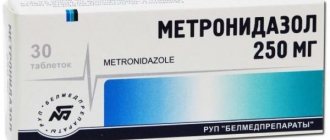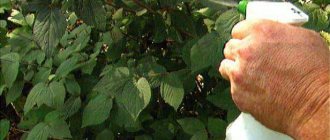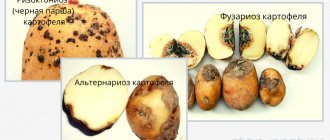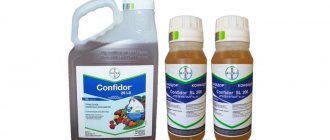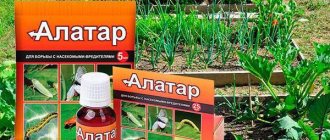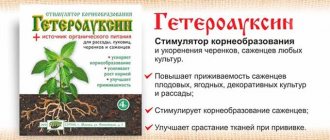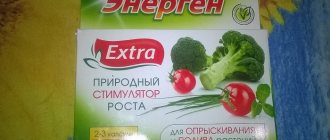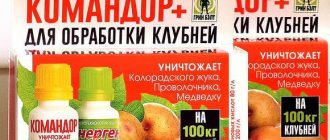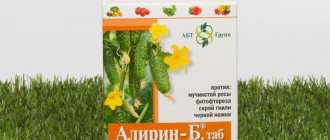Sporobacterin: methods of use for plants, how to dilute the drug, reviews
Most plants are grown through seedlings. And it is at this stage that they require support in order to turn into strong and healthy plantings in the garden or at home.
Creating ideal conditions for plants is not an easy task, because it is almost impossible to take everything into account. Sometimes this may be a lack of sun, too dry air, watering at the wrong time or excessive soil moisture and much more. Therefore, the best prevention for seedlings will be treatment with special preparations. The article will discuss the fungicide Sporobacterin
.
The content of the article:
Composition and action of Sporobacterin Spectrum of application Mechanism of action Release form For which plants can be used How to propagate Sporobacterin Sporobacterin: instructions for use for seedlings for indoor plants and flowers for seedlings of vegetable crops for fruit and berry crops Safety measures Storage rules Sporobacterin: analogues Cost Biofungicide Sporobacterin: reviews
Instructions for use of the drug Sporobacterin
The fungicide has a wide spectrum of action. Therefore, it is used for different purposes. To achieve maximum results, you need to read the instructions for Sporobacterin for plants.
For seedlings
First of all, the drug is used for soaking seeds. For this, a working fluid is prepared. Add 1.5 g of powder to 1 liter of water. The seeds are placed in this solution for 2 hours. After planting the seedlings, the soil is watered with Sporobacterin. For 1 kg of soil, 100 ml of solution is required.
Treatment of planting material with the drug contributes to its disinfection from phytopathogens
Important! Watering with the drug is required 1 and 2 weeks after germination. Starting from day 15, the sprouts are sprayed.
According to the instructions for use of Sporobacterin Rassada, the ratio of the components of the working solution is the same as for irrigation. For 1 sq. m. of seedlings requires 1 liter of the finished product.
For indoor plants and flowers
The product is used for preventive or therapeutic treatment. The main method is spraying the diseased plant. The entire flower needs to be treated, not just the affected areas.
Procedure steps:
- Dilute 5 g of powder in 1 liter of warm water.
- Add sugar, wait 30 minutes.
- Spray diseased plants with a spray bottle.
- Carry out preventive soil treatment (50-100 ml of liquid for each plant).
Biological fungicide can be used at any stage of plant development
For preventive purposes, it is recommended to treat the soil in pots and flowerpots when replanting. For 1 indoor plant, 50 ml of working solution is enough.
For vegetable crops
"Sporobacterin" can be used at all stages of cultivation. When processing vegetables, several nuances should be taken into account.
When growing plants from seeds, “Sporobacterin Rassada” is used. Planting material is soaked for 6 hours in a one percent solution of the drug.
If tubers are used for cultivation, they need to be sprayed before planting in the ground. For 1 kg of planting material, prepare a solution of 0.5 g of powder and 1 liter of water. According to reviews of Sporobacterin Rassada, such treatment is sufficient to prevent fungal infections in the early stages of growth.
The drug provides prevention and treatment of bacterial and fungal plant diseases
In the future, the following algorithm applies:
- Spraying every 20 days (10 liters of solution per 100 square meters of planting).
- Watering at the root during the leaf formation phase (1 g of the drug per 10 liters of liquid).
- Treating the soil around the plant (1 g of powder diluted in 10 liters of water per 1 square meter).
Important! The use of Sporobacterin should be stopped 2 weeks before the planned harvest date.
The treatment can be repeated many times. Their number is not limited, but an interval must be observed - at least a week.
Features of vegetable processing:
For fruit and berry crops
When planting, you should treat the soil in the holes before placing seedlings or cuttings in them. This will protect the plant from diseases during the period of adaptation and rooting. For these purposes, prepare a solution of 10 g of powder and 0.5 liters of warm water. For 1 plant you need from 50 to 100 ml of such liquid.
Due to the content of phytohormone in the preparation, the immunity of plants is increased
Subsequently, adult fruit bushes and trees are treated with Sporobacterin by spraying. For the procedure, prepare a solution of 20 g of powder per 10 liters of water. Subsequently, it is diluted to 20 liters and used for spraying. A similar amount of the drug can be taken to water the soil.
Composition and action of Sporobacterin
A product of biological origin intended for the prevention and treatment of infection in plants.
The composition is based on 2 main bacteria that form spores:
- Bacillus subtilis (from 108 CFU);
- Trichoderma fungus - Trichoderma viride (from 106 CFU).
Sporobacterin is the best remedy for young, immature seedlings, because the chemicals have a depressing effect
. To be moved into open ground, seedlings must have good immunity for better survival.
Simply soaking the planting material in the solution has a good effect. Such seeds germinate faster, bacteria are destroyed from the inside and outside, that is, complete disinfection occurs.
Sporobacterin: how to protect seedlings from diseases
Seeds are a source of plant infection by pathogens (phytopathogens). Phytopathogens cause plant diseases such as downy mildew, scab, phomosis, bacteriosis, various types of rot, anthracnose, black leg, powdery mildew, late blight and many others.
Sporobacterin, Sporobacterin - seedlings, Sporobacterin - vegetation: how to protect seedlings from diseases.
Diseased seeds cannot be distinguished from healthy ones, therefore only seed disinfection makes it possible to suppress the development of phytopathogens in the early stages of plant development.
An effective preparation for seed disinfection is the biofungicide Sporobacterin, the active substance of which is the microorganisms: the fungus Trichoderma viride (Trichoderma) and the bacterium Bacillus subtilis (Bacillus subtilis).
Trichoderma, penetrating into the roots of phytopathogen fungi, actively grows in the cells, which leads to their death. In addition, Trichoderma suppresses the growth and development of pathogens due to the release of large amounts of antibiotics. Bacillus subtilis also suppresses the development of phytopathogens, producing more than 70 types of antibiotics. The impact of Bacillus subtilis on phytopathogens is to create unfavorable living conditions for them (soil acidification), as well as the creation of nutritional deficiency, since Bacillus subtilis develops faster than pathogens and populates the maximum surface area.
Antibiotics secreted by Trichoderma and Bacillus subtilis suppress the growth and development of pathogens and are effective stimulators of plant growth and immunity.
Spilling the soil before sowing seeds with a solution of Sporobacterin helps saturate the seedling soil with antagonistic microorganisms. Trichoderma and Bacillus subtilis develop faster than pathogens, concentrate in the root zone of seedlings and actively suppress the growth and development of bacterial and fungal pathogens of plants, creating a protective space around young plants.
Biological fungicide "Sporobacterin - Seedling" for protecting seedlings of vegetable, fruit and flower crops from fungal and bacterial diseases.
The use of the drug Sporobacterin guarantees the production of healthy and strong seedlings that are resistant to diseases and various stresses.
When planting seedlings in open ground, it is recommended to preventively water the soil and spray the plants with Sporobacterin throughout the summer.
We have also prepared a video for you in which we will tell you why and how to soak seeds before planting.
Range of applications
The completely natural composition of Sporobacterin makes it possible to use it on many crops at different stages of development.
Effective for the following plant ailments:
- mucous bacteriosis;
- scab;
- blackleg;
- late blight;
- powdery mildew;
- root rot;
- fusarium;
- moniliosis;
- gray rot.
The biological fungicide Sporobacterin is very easy to use and completely safe for the environment and humans. Does not change the acid-base balance of the soil.
Attention!
Sporobacterin is effective only against infections and plant diseases. It does not affect pests.
Action of the fungicide
Purpose of Sporobacterin
The powerful protective effect of this drug is ensured due to its composition:
- Bacillus subtilis secretes enzymes and polypeptide antibiotics that prevent the development of most phytopathogenic bacteria.
- Trichoderma has an antagonistic effect against parasitic fungi. Its spores, actively growing inside their cells, simultaneously releasing antibiotics, lead to the death of pathogenic fungi.
- Once in the soil, Trichoderma and Bacillus are actively involved in the processing of organic matter, helping plants receive more useful nutrients.
Through its dual action, Sporobacterin simultaneously copes with pathogens of plant diseases that are of fungal and bacterial origin. This guarantees high results in the fight against:
- moniliosis;
- macrosporiosis;
- powdery mildew;
- rhizoctoniasis;
- late blight;
- fusarium wilt;
- vascular and mucous bacteriosis;
- gray rot;
- black leg;
- root rot;
- scab.
For which plants can Sporobacterin be used?
Sporobacterin is used for absolutely any plants that are infected or have a high susceptibility to disease.
There are reviews about the use of the drug Sporobacterin for indoor flowers, for example, for orchids, roses and other decorative plants.
. It is effective for fruit and berry plantings. Sporobacterin is used for soil treatment in order to disinfect the soil. Sporobacterin has proven itself well for seedlings.
On a note!
The time for active use of Sporobacterin is from the beginning of spring to the end of May.
Pharmacological action of the probiotic
- The drug is effective in the treatment of diarrhea, bacterial and infectious diseases of the gastrointestinal tract.
- The bacteria Bacillus subtilis have a wide spectrum of action, producing lipase, amylase, lysozyme, proteolytic enzymes and other useful substances for the body.
- With regular use, the harm caused to the body during stressful situations, unfavorable environmental and production factors, increased mental and physical stress, dietary errors, and deficiency of vitamins and minerals is reduced.
- Normalizes metabolic processes.
- It has a pronounced immunostimulating effect, as well as moderate antiallergic effects.
- Promotes the formation of natural microflora and regulation of intestinal motility.
- The active activity of microorganisms, in a properly selected composition, promotes rapid recovery and restoration.
Read: how to treat intestinal dysbiosis in infants.
How to dilute Sporobacterin
Sporobacterin liquid is prepared from concentrated powder. They treat the affected areas of plants. There are several options for how to dilute the product.
Methods for preparing Sporobacterin for plant treatment:
- soaking planting material: take 1.5 grams of powder per 1 liter of filtered water;
- soil moisture: 20 g per 10 liters of liquid;
- spraying from a spray bottle: 20 g per 10 liters of water;
- for treating individual areas: 20 g per 20 liters.
Important information!
Sporobacterin is diluted exclusively in warm water, adding 1 spoon of sugar. This is necessary to activate the activity of bacteria.
After preparing the solution, it must be kept for half an hour, after which it is shaken and the plants are processed.
It should be noted how long the Sporobacterin solution is stored. It is used only fresh.
Mode of application
The prescribed dose of the drug Sporobacterin is diluted 10-15 times with cooled boiled water. Sporobacterin is prescribed 30-40 minutes before meals. For the treatment of diseases of the gastrointestinal tract: Children: for the treatment of acute bacterial intestinal infections, including acute dysentery, salmonellosis: at the age of 6 months to 3 years, 0.5 is prescribed orally ml (8-10 drops) 2 times a day for 7-10 days; over 3 years - 1 ml (17-20 drops) 2 times a day for 7-10 days; for the treatment of dysbacteriosis after bacterial infections or the use of antibiotics: at the age of 6 months to 3 years, 0.5 is prescribed orally ml (8-10 drops) 2 times a day for 20 days, over 3 years - 1 ml (17-20 drops) 2 times a day for 20 days. If a nursing mother has dysbacteriosis, she is recommended to take the drug 1 ml 2 times a day during the period of treatment of the child. Adults: - for the treatment of acute bacterial intestinal infections, including acute dysentery, salmonellosis: the drug is prescribed orally 1 ml ( 17-20 drops) 2 times a day for 7-10 days; - for the treatment of dysbiosis after bacterial infections or the use of antibiotics: the drug is prescribed orally 1 ml 2 times a day for 20 days. In surgical practice - for treatment and prevention of surgical infection of soft tissues: the drug is prescribed orally, 1 ml 2 times a day for 7-10 days; for prophylactic purulent-septic complications in the postoperative period: the drug is prescribed orally, 5 ml 1 time per day (at night ) for 5 days before surgery and 5 ml 1 time per day (at night) for 5 days after surgery or injury. If necessary, courses of treatment can be repeated.! An opened bottle of the drug, closed with a cap, can be stored for no more than 10 days at a temperature of 4 to 8°C.
Sporobacterin: analogues of the drug
There are no analogues of Sporobacterin today
. There are products that contain Bacillus subtilis.
Such monopreparations include:
- Alirin-B, F/SP, Tab;
- Baktofit, JV;
- Bisolbicide, J;
- Vitaplan, JV;
- Gamair, KS.
The question is often asked: which is better Fitosporin or Sporobacterin?
The first one is more popular among summer residents. However, if you look at the composition, then Sporobacterin is more powerful. Both drugs are effective. None of them have any obvious advantages.
Composition, formulation and release format
The active ingredients are the bacterium Bacillus subtilis titer no less than 108 CFU/g and the fungus Trichoderma viride , strain 4097 titer no less than 106 CFU/g.
Chemical class – biological pesticides, bacterial fungicides.
Preparative form - SP (wetting powder).
Release format – packages of various packaging:
- "Sporobacterin", 20g;
- “Sporobacterin-Vegetation”, 10g;
- "Sporobacterin-Rassada, 5g.
Manufacturer of the drug – Russian
Application of biofungicide "Sporobacterin, SP" when soaking seeds
Biological product Sporobacterin: reviews of use
Zhanna Fedorovna, Leningrad region. I use exclusively natural products to treat houseplants. I liked Sporobacterin for its affordable price and good composition. Reviews about Sporobacterin are not often seen on forums. I decided to try it as a preventative measure. I use it both for seeds for planting and for mature plants. I just spray it. Result: healthy, strong flowers.
Evgeniy Viktorovich, Voronezh region. I use a fungicide to treat tomato seedlings. I always first soak the seeds for 6 hours, as stated in the instructions for using Sporobacterin, after which I treat the young seedlings. Adult plants do not get sick, look great, and bear fruit. It does not affect the taste of the crop in any way.
Ekaterina Sergeevna, Novosibirsk The safety and effectiveness of Sporobacterin are two significant reasons why I chose it. It perfectly eliminates fungus at the initial stage and does not harm the plants at all. I often use it as a preventative measure. I think that in the advanced stages of the disease, it is still worth choosing something stronger.
Similar drugs
There are many similar probiotics on the modern pharmacological market. Among the well-known drugs produced in Russia, the following can be noted:
- Biosporin,
- Bactisporin,
- Baktisubtil.
They also contain live colonies of microorganisms and fungal spores to restore metabolic processes in the human gastrointestinal tract.
When treating intestinal infections, Ersefuril has a similar effect.
On average, the cost of a bottle of Sporobacterin ranges from 350 to 600 rubles, depending on the region and pharmacy markup. It is important to understand that the price of a product includes not only its cost, but also transportation costs, as well as the seller’s benefit.
Advantages of the drug
What is the secret of the popularity of phytosporin? Why is he so popular?
The advantages of the drug include effectiveness, ease of use and long shelf life of the stock solution prepared from the paste.
Areas of application of phytosporin:
- pre-sowing treatment of soil and seeds for the purpose of disinfection;
- protection against diseases of garden crops and indoor plants;
- preventive spraying and treatment of diseased plants;
- treatment of seedlings before planting in the ground;
- for rooting cuttings of various plants;
- for spraying and watering garden crops in order to maintain immunity to diseases, and the ability to do these operations with the help of phytosporin remains throughout the entire growing season;
- for prevention during storage of tubers and flower bulbs,
- from bad weather and other stresses.
The use of the product protects plants from the following unpleasant and common diseases:
- blackleg,
- late blight,
- bacteriosis,
- fusarium wilt,
- rhizoctoniasis,
- rust,
- black spot,
- root rot,
- scab,
- powdery mildew and many, many other plant diseases.
Rules for applying Sporobacterin
10 g of the powder preparation is dissolved in a small amount (500 ml) of non-cold and non-chlorinated water, add 0.5 tablespoon of sugar, stir and leave for half an hour in a warm place. Then add 9.5 liters of water, mix and use for watering or spraying.
Scheme for using Sporobacterin on strawberries:
- The ridges are irrigated with the solution 7–14 days before planting the mustache, distributing it over 10 square meters. m. at least 5 liters.
- The holes are watered when planting strawberry rosettes and again after half a month, spending half a glass of liquid on each plant.
- The roots of the “whiskers” are dipped in liquid before planting.
- If earlier cases of plant wilting were observed, then strawberry bushes are watered annually with a fungicide at the root twice a month, throughout the entire season (for prevention).
- The strawberry plantation is sprayed every two weeks against a complex of fungal diseases. Treatments are stopped half a month before the berries ripen and resumed after fruiting. 10 liters of solution are consumed per 1 hectare.
Experienced gardeners recommend increasing the concentration of the drug by 2 times when spraying (20 g per bucket of water).
Sporobacterin
Moderator: Floriana
Sporobacterin
Post by Natarina » Jan 30, 2021, 10:57 pm
Sporobacterin
Hello dear forum users. I recently came across this miracle. It is called “Sporobacterin”. . In the description: “The only biological fungicide that has 2 active components: the fungus Trichoderma viride and the bacterium Bacillus subtilis”
But, as far as I know, these 2 active components are NOT COMPATIBLE. There are a lot of articles on this subject. That trichodermin (gliocladin, etc.), i.e. Trichoderma viride, should not be mixed with phytosporin (Bacillus subtilis). They won't let each other work! So maybe that's why he's the only one? It’s just that other manufacturers could not even dream of producing such a miracle and doing such stupidity! Or maybe I'm misunderstanding something? And all the information regarding the incompatibility of the Trichoderma fungus and Bacillus subtilis is not correct, and the authors who wrote about the incompatibility are incompetent?! I would really like to know the opinion of forum members on this matter. And then I was even somehow confused.
Sporobacterin
Post by Florian » 31 Jan 2021, 01:25
Natarina, yes, that's right.
Bacterial preparations based on Bacillus subtilis (Fitosporin, Gamair, Alirin) cannot be combined with preparations based on the fungus Trichoderma viride (Trichodermin, Glyokladin), because These are competitive species. By releasing biologically active substances, they will suppress each other. Therefore, if it is necessary to use both drugs, it is recommended to maintain an interval between them of 1-2 weeks. Or you can differentiate the scope of their application - for example, add Trichodermin to the soil, and treat the above-ground part of the plant with Fitosporin (or vice versa).
However, the drug Sporobacterin, the active ingredients of which are Bacillus subtilis and Trichoderma viride strain 4097, officially exists (State registration number 033-02-447-1). The manufacturer writes that Sporobacterin “Provides the prevention and treatment of fungal and bacterial plant diseases: powdery mildew, late blight, downy mildew, root rot, fusarium wilt, bacterial spotting, black leg, vascular and mucous bacteriosis, rhizoctonia, moniliosis, macrosporiosis, gray mold , mildew, oidium, scab and other plant diseases.”
Sporobacterin
Post by Natarina » Jan 31, 2021, 11:05 am
Security and storage
"Fitosporin M" is classified as a substance of the 4th hazard class. This means that it is practically harmless, provided that the person does not suffer from allergic diseases.
However, when preparing and watering, you should avoid getting the drug on the skin, in the oral cavity, and especially in the eyes. If this does happen, the product should be washed off under running cold water.
If you accidentally swallow a solution that gets into the oral cavity, you must rinse your stomach, induce vomiting and take 3 tablets of activated carbon. After this, you should visit a doctor.
Any remaining unused solution can be stored for up to two years in a tightly closed container. It should be placed in a dark place inaccessible to children.
Types of drug
The drug is available in several versions:
in liquid form; This is a ready-made drug, it cannot be frozen and it has such a softer and easier effect.
in the form of a paste; The substrate looks like a dark cake in a plastic bag weighing 200 g in powder form.
in powder form. It is a grayish powder, packaged in bags of 10 or 30 g.
There is Fitosporin M Reanimator on sale, which, along with beneficial bacteria, contains a growth stimulator and fertilizer. It is recommended to use it when planting plants.
What do you want to say? The most convenient option for indoor plants is a liquid solution. The paste is more suitable for garden plants. The disadvantage of the powder is its long dissolution. Let me remind you that any option that you like best is suitable for treating plants. So, let's move on to preparing the drug for use.
Reviews
Most patients leave positive reviews about the use of the drug.
In particular, the use of Sporobacterin helps to cope with stool disorders caused by dysbacteriosis, as well as intestinal infections, including staphylococcal and streptococcal ones.
Taking a probiotic can reduce the likelihood of developing bacterial infections during surgical interventions. The drug is often used in the treatment of young children.
Most patients consider the disadvantages of the drug to be its rather high price and the presence of adverse reactions. Thus, when taken for more than 7-10 days, many patients note the appearance of chills, and in rare cases, skin rashes. After stopping taking Sporobacterin, the adverse reactions went away.
Biological preparations for seedling diseases: use and effect of the biofungicide Sporobacterin
Seedlings at home constantly lack light, the air dried out by radiators is replaced by drafts, and seeds and soil can harbor dangerous microorganisms. In such conditions, seedlings look exhausted, often get sick and die. Only timely prevention and systematic use of biological preparations with bactericidal and fungicidal effects can help.
How biological products help against seedling diseases
The most dangerous thing for young immature seedlings is infection with phytopathogens - pathogens. Their dominance in seed material and soil leads to diseases and death of tender seedlings.
To provide seedlings with favorable conditions for growth and development, it is first recommended to carry out preventive treatments. To protect seeds, soil and seedlings, it is effective to use the biological product Sporobacterin with bactericidal and fungicidal effects .
- The active ingredients of Sporobacterin are spores of the fungus Trichoderma viride (Trichoderma) and the bacteria Bacillus subtilis (Bacillus subtilis).
- They also cope with pathogenic fungal microflora and do not allow bacterial microflora to grow.
Thus, complex double protection of plants occurs from:
- late blight,
- downy mildew,
- bacterial cancer of tomatoes,
- root rot,
- mucous bacteriosis,
- scab and many other dangerous diseases.
See the description of the biofungicide Sprobacterin on the manufacturer’s website
How to properly use biological products for seedling diseases
For biological products to work, you need to follow simple recommendations.
1. Start preparing to protect seedlings from diseases in advance: soak the seeds in biofungicidal solutions
How does the biofungicide Sporobacterin work when soaking seeds:
- suppresses plant pathogens on the surface and inside (latent infections);
- accelerates seed germination, even with a thick shell.
2. Use biological products for seedling diseases systematically.
- After all, biologically active microorganisms not only destroy harmful fungi and bacteria, but also create comfortable conditions for the growth of beneficial microflora.
- Strengthen the protective functions of plants and their ability to resist pathogens.
See the description of the biofungicide Sprobacterin – Seedlings on the manufacturer’s website
3. Follow the rules for preparing soil for seedlings: it must be sterile, loose, breathable and moisture-absorbing.
- If you buy, choose high-quality soils. If you prepare the soil yourself, take care of disinfection.
Garden soil, especially from greenhouse beds, contains dangerous pathogens that accumulate in the soil from year to year. However, remember that calcining the soil in the oven kills not only harmful, but also beneficial microflora.
Therefore, for a reliable result, it is better to spill the soil mixture with a biofungicidal solution before sowing.
How does the biofungicide Sporobacterin work for disinfecting seedling soil:
- saturates the soil with beneficial microorganisms,
- suppresses phytopathogens,
- creates a protective space around the roots of future plants,
- releases the required amount of biologically active substances (vitamins, enzymes, growth substances, phytohormones, etc.),
- stimulates the development of the root system, including the protective forces of young seedlings.
Side effects
Side effects are very rare and are usually caused by an overdose of the drug. Possible adverse reactions are:
- diarrhea;
- abdominal pain;
- allergic skin rashes;
- chills.
All adverse reactions completely disappear within 24 hours from the moment the dosage is reduced or completely stopped taking Sporobacterin.
Overdose
No information was provided about overdose. However, doctors do not exclude the possibility of this condition. In case of overdose in a person, the following is noted:
- Head pain, dizziness;
- Severe abdominal pain, flatulence, bloating;
- Development of gastritis, arthralgia, myalgia;
- Impotence (this condition is reversible);
- Skin rash, itching, peeling, Stevens-Johnson syndrome.
If an overdose occurs, the person should immediately stop taking the medication. Next, he needs to carry out treatment based on the symptoms that appear.
Contraindications
If you are allergic to any medications, taking Sporobacterin should be started with caution.
Do not use a drug with damaged packaging, altered physical characteristics, or the presence of foreign impurities. Medicine without labeling is unsuitable for use.
Use during pregnancy and lactation
The effect of the drug on the course of pregnancy has not been studied. Sporobacterin is approved for use in the treatment of children older than six months and women during breastfeeding.
- If you have any symptoms of the disease, you should immediately consult a doctor. You can view a list of gastroenterology clinics on our website
- You will be interested! The article describes symptoms that make it possible to suspect the presence of liver disease in the early stages
- You will also be interested in learning more about the treatment of various diseases of the gastrointestinal tract
Application of Amber for orchids
Everyone knows that orchids are extremely capricious flowers that take root at home only with a few “selected” gardeners. But this product will help orchids to take root well and will increase the chance of breeding them at home by at least 2 times.
Method of using Amber for orchids:
- Stimulating watering at the roots is carried out once every 3-4 weeks, and only during the active growing season of plants. Keep in mind that watering sleeping orchids with Amber or any other stimulant simply means killing them! Dosage – 20 ml of concentrate per 1 liter of water. Water directly under the root, in small portions, at intervals of 1-3 hours.
- Soaking orchid roots before planting or replanting the bulb. We advise you to carry out this action together with wiping the leaves. The solution is prepared in the same way as for watering at the root. The roots of healthy orchids are soaked in the solution for half an hour; if the orchid is replanted because it is withering, the roots should be soaked for 2-2.5 hours.
Note! Orchids revived by Yantarine or other growth stimulants are prohibited from being planted in a solid container or artificial substrate until their constant flowering is restored
Description of the drug
Sporobacterin was developed and released by ORTON LLC. The drug represents a group of biological fungicides. Used for the prevention and treatment of vegetable, flower, berry, and fruit crops from diseases of fungal and bacterial origin. Release form: powder. Sold in bags of 20 g. The basis of the drug: Trichoderma viride mushroom and biologically active bacteria Bacillus subtilis.
Application
In most cases, drugs only affect pathogenic fungi or bacteria. Biologists have managed to develop a universal form of Sporobacterin with double action. It can be used to treat seeds, seedlings, bulbs, fruit-bearing plants during flowering. Another feature of the drug is its ability to penetrate into the cells of the treated culture. This allows you to protect living organisms for a long time.
The fungicide can cure:
- downy mildew;
- late blight;
- powdery mildew;
- root rot;
- fusarium wilt;
- bacterial spots on leaf blades;
- black leg;
- bacteriosis;
- macrosporiosis;
- gray rot;
- mildia;
- scab;
- oidium.
Advice!
Prepare the solution for treatment while wearing gloves and a protective mask. Avoid contact with eyes and mucous membranes, as it may cause poisoning.
Advantages and disadvantages
The main advantage of Sporobacterin is its ecological composition, which does not harm plants, animals and the environment. Does not accumulate in fruits. Overdose of plants is excluded. You can process it in dry weather and after rain; beneficial bacteria and fungi quickly penetrate the cells. Even if rain washes away the drug from the upper part of the treated crop, Sporobakerin will still be absorbed through the root system. In addition to its protective function, the fungicide acts as a source of nutrition for plant cells and has a positive effect on root development
No shortcomings have been identified, except that caution must be observed during operation

